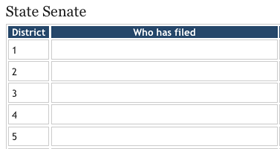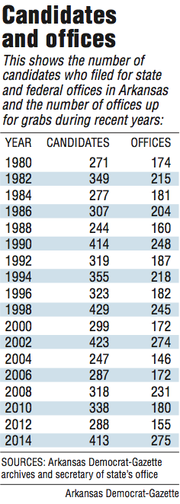More Republicans than Democrats filed for state and federal offices this year, and officials for the parties disagree on what it portends for the Nov. 4 general election.
RELATED ARTICLES
http://www.arkansas…">Candidate filings for state and federal officeshttp://www.arkansas…">Independent and write-in candidates
A total of 132 Republicans and 88 Democrats filed for 130 state and federal offices during the week long filing period that ended Monday, according to the secretary of state’s office, headed by Republican Mark Martin.
Nineteen Libertarian candidates, two Green Party members and one independent candidate also filed for these offices, Martin’s office reported. In addition, 171 nonpartisan candidates filed for 117 judicial and 28 prosecuting attorney posts. The 2013 Legislature enacted a law to make prosecuting attorney a nonpartisan office.
In comparison, 136 Democrats and 124 Republicans filed to seek state and federal offices in 2012, Martin’s office reported two years ago.
And 196 Democrats and 108 Republicans filed to run for state and federal offices in 2010, then-Democratic Secretary of State Charlie Daniels’ office reported four years ago.
During the 2010 and 2012 elections, Republicans in Arkansas made historic gains by generally linking Democrats to President Barack Obama. Democrats in Arkansas countered by often linking themselves to term-limited Democratic Gov. Mike Beebe, who is generally popular, and stressing their independence from Obama.
More Republicans than Democrats filed for state and federal offices this year because the Republican Party is becoming more attractive in “a sign of a developing party,” and the Democratic Party is having a more difficult time finding candidates to run, said Hal Bass, a professor of political science at Ouachita Baptist University in Arkadelphia.
Republicans are trying to build on their momentum from the 2010 and 2012 elections, Bass said. He added that Democrats are trying to regroup because they “don’t want to squander their resources on” divisive primaries and are concentrating on winning in the general election.
It’s too early to tell which party’s strategy will work, he said.
Competitive party primaries can encourage people to participate in the primary election and help the winning candidate in the general election, Bass said. But they also could alienate supporters of the losing candidates and end up costing the winner of the primary the general election, he said.
The increased number of Republican candidates and primaries “means we are a growing party” with more people who believe the GOP can better represent Arkansans than the “typical Democrat system,” said Doyle Webb of Benton, chairman of the state Republican Party.
Webb added that aggressive primary elections will lead to a Republican Party that’s united behind the party’s nominee in the general election.
But Lizzy Price, a spokesman for the state Democratic Party, said Democrats “have fielded the strongest candidates with a message that working Arkansans believe in - good-paying jobs and strong schools.”
She described the state Republican Party as fractured and weak despite its sheer number of candidates.
“While the Republican Party is fighting a war among themselves, the Democratic Party will be fighting for Arkansans,” Price said.
During the past two years, Republican state lawmakers have been divided about whether the state should use federal funds to purchase private health insurance for low-income Arkansans as the Legislature has narrowly authorized funding for the private option. The federal money is available to the state under the federal Patient Protection and Affordable Care Act.
Webb pointed out that 29 Republican women filed for state and federal offices this year, while the Democrats have 18.
“If we had a war on women, why would they be running on our ticket?” he asked. He declined to define “a war on women” because he said Democrats use the term.
In response, Price said Webb has to look no further than U.S. Rep. Tom Cotton of Dardanelle, who voted against equal pay for women and was the only member of Arkansas’ congressional delegation to vote against the Violence Against Women Act twice.
The two highest-profile offices up for grabs this year are the U.S. Senate seat held by Democrat Mark Pryor of Little Rock and the governor’s office.
Along with Green Party and Libertarian candidates, Cotton is challenging Pryor in November.
Vying for governor, both former U.S. Reps. Asa Hutchinson of Rogers, a Republican, and Mike Ross of Little Rock, a Democrat, have opponents in the May 20 primary, though they’ve been criticizing each other for several months. Hutchinson is being challenged by businessman Curtis Coleman of Little Rock for the GOP nomination. Substitute teacher Lynette Bryant of Little Rock is taking on Ross for the Democratic nomination.
The state’s six other constitutional offices also are on the ballot this year. They are lieutenant governor, attorney general, secretary of state, treasurer, auditor and land commissioner.
There are contested Republican primary races for lieutenant governor (a post held by Springdale Republican Mark Darr until he resigned Feb. 1), attorney general (a post held by term-limited Little Rock Democrat Dustin McDaniel), auditor (a post held by departing Bryant Democrat Charlie Daniels) and treasurer (a post held by self-described independent Charles Robinson of North Little Rock, whom Beebe appointed after Newport Democrat Martha Shoffner resigned in May).
Four congressional seats are on the ballot this year with contested Republican primaries for the 2nd Congressional District seat held by Little Rock Republican Tim Griffin, who is running for lieutenant governor, and the 4th District seat held by Cotton. Republicans hold all of the state’s seats in the U.S. House.
The state House of Representatives is now made up of 51 Republicans, 48 Democrats and one Green Party member after Republicans gained control of the Legislature from the Democrats in the November 2012 elections for the first time in 138 years.
Ninety-two Republicans and 68 Democrats filed for the 100 state House seats on the ballot, according to the secretary of state’s office.
There are 18 contested Republican primaries and four contested Democratic primaries in the House of Representatives on May 20.
There are only Republicans running for 35 of the 100 seats and only Democrats seeking 27 seats.
Only Democrats and Republicans are vying for 32 of the seats, while only Democrats, Republicans and Libertarians are seeking two of the seats. Republicans are vying with Libertarians for three of the seats; a Democrat is jockeying with a Libertarian for one seat.
“We want to maintain and expand the majority and I believe we have an excellent chance at that,” said House Republican leader Bruce Westerman of Hot Springs, who is running for the 4th Congressional District seat.
He said Republicans have a good shot at picking up the seats of state Rep. Nate Steel, D-Nashville, who is running for attorney general, and term-limited Rep. John Edwards, D-Little Rock, and at ousting Reps. Fonda Hawthorne, D-Ashdown, David Kizzia, D-Malvern, Sheilla Lampkin, D-Monticello, and Homer Lenderman, D-Brookland.
But House Democratic leader Greg Leding of Fayetteville said that “it’s pretty much a jump ball” about which party will control the House after November.
He said Democrats have shots to oust Reps. John Hutchison, R-Harrisburg, and Rep. Richard Womack, R-Arkadelphia, and gain the seat held by term-limited Rep. Allen Kerr, R-Little Rock.
The state Senate is made up of of 22 Republicans and 13 Democrats.
Eighteen Republicans and eight Democrats have filed for the 18 Senate seats on the ballot. Eleven of the seats are held by Republicans; the seven other seats are held by Democrats.
There are four contested Republican primaries in the Senate, but no contested Democratic primaries.
Only Republicans are running for nine of the seats and Republicans and an independent candidate are seeking one seat. Only Democrats are running for five of the seats. Only Democrats and Republicans are seeking three of the seats.
Front Section, Pages 1 on 03/09/2014


